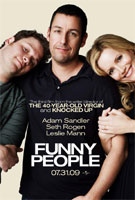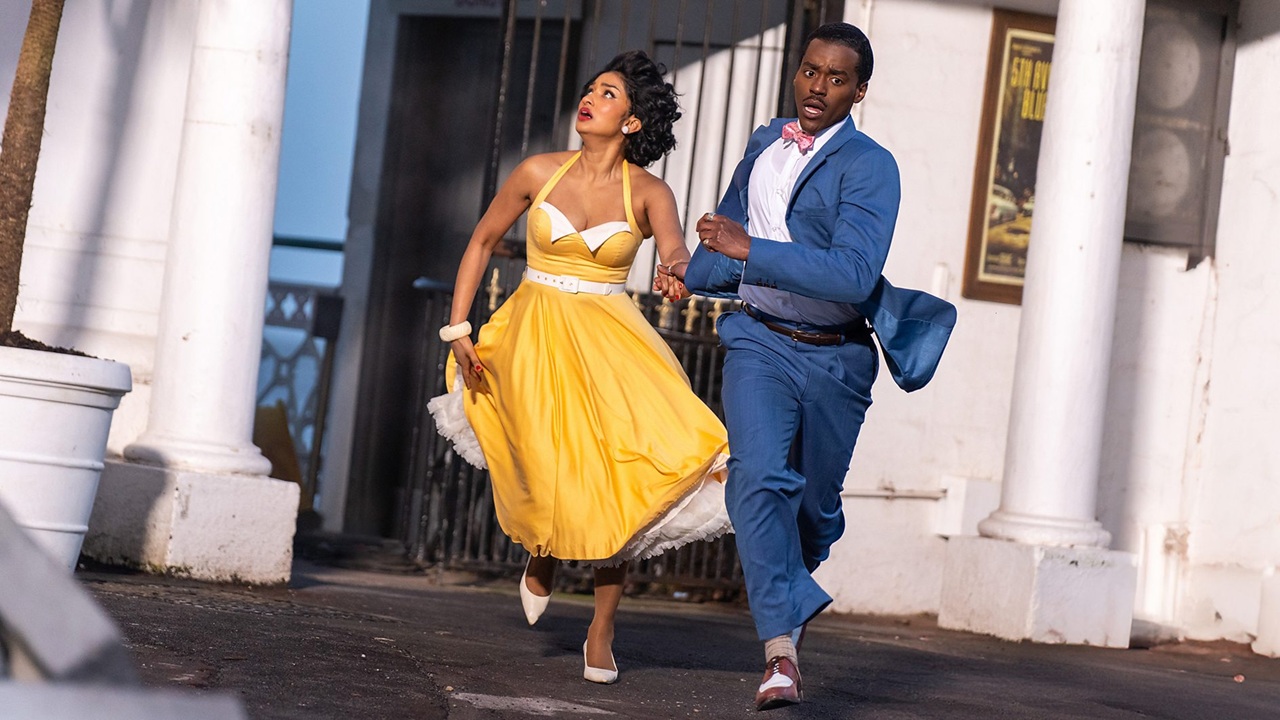Funny People is an inevitable step forward for Judd Apatow as a writer-director. Having played around in the raunch comedy sandbox for several years now, bringing us genuine gems 40-Year Old Virgin and Knocked Up and producing smaller wonders like Superbad, Apatow decided to put on his grown-up pants for his third feature, tackling a story about growing old, cancer, parenthood, failure, and selling out. To do it he's enlisted old friend Adam Sandler, a comedian who's already proven capable of digging deep and providing the dramatic goods.
It's not that Apatow made the dramatic leap too soon, since much of Funny People's pathos and heartfelt drama works well. But the indulgence he has always shown his actors, letting scenes run overlong and keeping in extra shots of his cute kids, cripples the movie, which meanders around three or four plots and comes to as many conclusions about Life with a Capital L before ending seemingly at random, aware it has exhausted its audience's indulgence for the guy we used to rely on to make us laugh.
Not that Funny People doesn't work on a comedic level too, riffing on big-budget Hollywood comedy and stand-up tropes to create the world in which George Simmons (Sandler) is a famous comedian, having long ago sacrificed his edge for high-concept crap like Mer-Man and Re-Do. George's movies are parodies, but they also go beyond the easy laugh, and it's clear that Sandler is having a little fun at his own career's expense. Unlike the married Sandler, though, George is a lonely rich man who's also dying, as he finds out in the film's first scene, from some vaguely defined blood cancer.
The film develops nicely as George, in some kind of cry for help, takes the stage at a comedy club and bombs, but also notices struggling young stand-up Ira (Seth Rogen), whom he hires to write jokes for corporate gigs like a MySpace retreat. George isn't exactly an unwilling mentor-- clearly he's brought the kid into his life to teach him a thing or two-- but he's not a very good one either; it's been a long time since George really tried to connect to another human, and he's out of practice.
Ira's life soon becomes fully enmeshed in George's, mostly because he didn't have that much going for him to begin with. One roommate (Jason Schwartzman) has a role on a terrible Saturday morning sitcom that's made him slightly rich, and the other is the basic Jonah Hill schlub character without much to add to the conversation. There's a cute stand-up (Aubrey Plaza) who lives across the hall, but Ira is so neurotic that he pushes her away as she gets closer.
Eventually Ira convinces George it's worth telling people important to him that he's dying, so George gathers the likes of Paul Reiser and, somehow, Eminem, as well as the girl that got away (Leslie Mann), a former actress now living with a buff Australian husband (Eric Bana) and two adorable daughters (Apatow and Mann's own, Maude and Iris Apatow) in northern California. George and Laura's connection is palpable, old hurts quickly forgotten, and George knows quite well that she never would have come back into his life if it weren't for his imminent death.
And then it, as it turns out, George isn't dying after all. And then he cooks up a harebrained, hugely selfish scheme to win Laura back, which begins the story that the movie should have followed to begin with. The last hour of the film takes place at Laura's house in the Bay Area, as George thinks he's won her back and Ira looks on in horror, and it's an effective sequence. Unfortunately it has little to do with what we've seen in the first half of the film, with stand-up or all the celebrity cameos, and has nothing to do with Ira's story at all. The idea seems to be that Funny People is a two-hander between George and Ira, but much as George's life consumes Ira's, his story overwhelms the film. It's unclear why we watch the entirety of a video of Maude Apatow singing "Memory" from Cats, while Ira's romantic entanglement is concluded in a 30-second toss-off scene.
As Apatow's career has gone on, his work has come to feel more insidery; the lonely Michigan high schoolers of Freaks and Geeks wound up at L.A. hotspots in 40-Year-Old Virgin and interviewed Ryan Seacrest in Knocked Up. Funny People is the full Hollywood immersion, stuffed with cameos from the likes of Carrot Top and James Taylor, and existing in a world in which everyone, whether they admit it or not, wants to be on television. There's a way to make that world relatable, but Funny People doesn't do it; it's impossible to relate to George Simmons' crisis of being too rich and too famous for his own good, no matter how much good work Sandler does in creating the character. Even Rogen's character, a nobody effectively standing in for the audience as he witnesses George's multiple meltdowns, is inaccessible; selfish and insecure, Ira is as big a pill as George is, and has even less reason to be.
Apatow has worked so brilliantly within classical Hollywood narratives in his previous films that it's disappointing to see him toss it aside here, settling instead for a story that shambles around inside a world without shedding much light on anything, including its characters. Ira and George go through a lot in the film, but it's unclear that either of them learns anything, except perhaps for that tired maxim that fame isn't what it's cracked up to be. The funny parts, of which there are many, and the successfully dramatic ones too are wasted, as Apatow is unable to trim his story enough to give it a coherent purpose. The best we can hope for is that Funny People is a necessary middle ground between Apatow's adolescent experiment and the more adult stories he has yet to tell. If that's the case, Funny People will still be a failure, but at least a noble one.
Staff Writer at CinemaBlend












